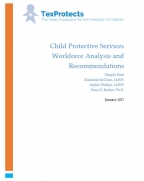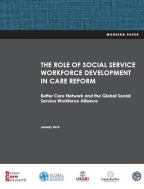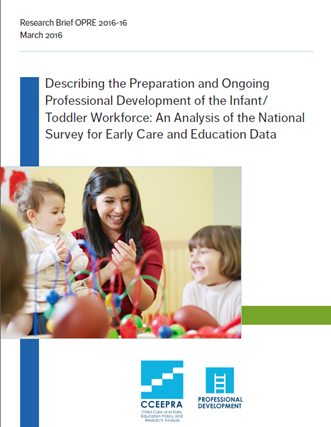Recognition of the profession
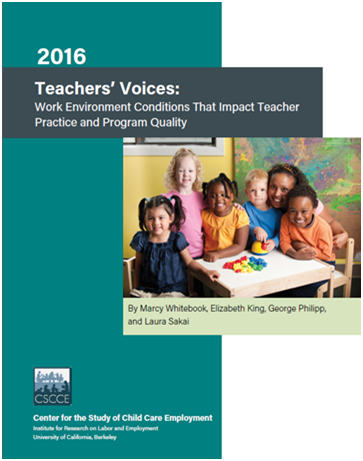
Summary:
Teachers’ Voices: Work Environment Conditions That Impact Teacher Practice and Program Quality presents the findings from the SEQUAL study focused on teaching staff. Supportive Environmental Quality Underlying Adult Learning (SEQUAL), developed by the Center for the Study of Child Care Employment (CSCCE), is used to document contextual information about workplace conditions that impact teacher practice and program quality and to build a vocabulary for the field around teachers’ needs for workplace support. The tool addresses five critical areas of teachers’ learning environments:
- Teaching supports;
- Learning opportunities;
- Policies and practices that support teaching staff’s initiative and teamwork;
- Adult well-being; and
- How supervisors and program leaders interact with staff to support their teaching practice.
In this study, assistant teachers, teachers, lead teachers and administrators employed at the 42 center-based early care and education programs reported assessments of their work environments for each of the five SEQUAL domains. This resource presents information for each of these domains, as well as recommendations for funders and policymakers.
You can find out more about SEQUAL on the CSCCE website here.
Summary:
Child Protective Services Workforce Analysis and Recommendations looks at the growing issue of child abuse in Texas and the great challenge of retaining a high-quality workforce in the state’s Child Protective Services (CPS). This documents explores trends and past reforms in the state, before addressing the issue of workforce turnover. Several issues that contribute to turnover are addressed, as well as the stages of the system.

Summary:
Towards the Right Care for Children: Orientations for reforming alternative care systems - Africa, Asia, Latin America, commissioned by the European Commission Directorate General for International Cooperation and Development commissioned SOS Children’s Villages International to conduct a study on the possible issue of institutionalization in six South and Central American, Asian and African countries, in order to strengthen the knowledge of the European Commission on the nature, the extent and scope of institutionalization and feasibility of the de-institutionalization.
The objectives of this research was to:
- map and summarize the existing knowledge on (de-) institutionalization in the three continents concerned;
- increase the knowledge base on (de-) institutionalization in the six countries; and
- provide guidelines for future EU strategies on (de-)institutionalization in developing countries.
This synthesis report brings together desk reviews and country studies through which a large collection of documents from various sources have been consulted.
Summary:
The Role of Social Service Workforce Development in Care Reform illustrates key issues by drawing on the experiences of Indonesia, Moldova and Rwanda – three countries are in the process of reform. Each country's reform takes place within their own context and history, social and political system, protection structure and services, and social services education system.
The case studies highlight each country’s reform processes and identifys learning in terms of the approach taken to strengthen and align the social service workforce given the needs of the system, the scope and actors involved, and the different care reform strategies and outcomes. The case studies are presented with recognition of the ongoing and dynamic process and are examples from different stages and contexts of reform.

Summary:
Despite increased funding and many reforms, most education systems are still seeking ways to better prepare their students for a world in which technological change and the digital revolution are changing the way we work, live and relate to one another. Education systems that have succeeded in improving student outcomes show that the way forward is by making teachers the top priority. The adaptability of education systems and their ability to evolve ultimately depends on enabling teachers to transform what and how students learn. This requires strong support and training for teachers, both before and after they enter the profession, with new forms of professional development to help teachers engage in more direct instruction and adapt it to the needs of their diverse classrooms. Education systems need to perform well in two dimensions: excellence and equity. Many high performers do well on both, demonstrating that they are not mutually exclusive. To do so requires specific measures to overcome factors that can hinder student performance, such as socio-economic background, immigrant status and gender.
Summary:
The Best Teachers for Our Littlest Learners? Lessons from Head Start's Last Decade aims to inform efforts to strengthen the early childhood workforce by documenting the current state of the Head Start workforce in the United States. Through five parts, this paper examines the effects of recent efforts to improve the skills of Head Start teachers. This paper includes:
- a review the evolution of Head Start workforce policy over the last 50 years;
- an analysis of the impact of the most recent reauthorization of Head Start;
- case studies of the evolution of the Head Start workforce in four states;
- a discussion of how the broader policy and research context has evolved since the last reauthorization of Head Start; and
- policy recommendations to strengthen the Head Start workforce.
Summary:
Describing the Preparation and Ongoing Professional Development of the Infant/ Toddler Workforce: An Analysis of the National Survey for Early Care and Education Data presents an analysis describing the professional development activities of the United States’ Infant/Toddler (I/T) workforce. The analyses shared in this brief aim to help the filed better understand the strengths and needs of the I/T workforce in center-based and home-based early care and education programs.
Summary:
Child Care: Research-Based Policy Recommendations for Executive and Legislative Officials in 2017 presents the following set of reccomenations:
- Use regional market rate survey data to inform a tax credit formula that will provide a true benefit to families.
- Support a highly effective child care workforce with scholarships for training and education.
- Use caution when amending child care regulations, specifically child-teacher ratios and group size requirements.
This short policy brief was released by Child Trends.
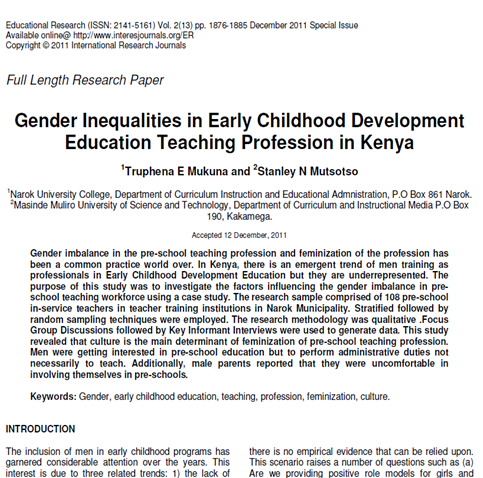
Summary:
Gender imbalance in the pre-school teaching profession and feminization of the profession has been a common practice world over. In Kenya, there is an emergent trend of men training as professionals in Early Childhood Development Education but they are underrepresented. The purpose of this study was to investigate the factors influencing the gender imbalance in pre school teaching workforce using a case study. The research sample comprised of 108 pre-school in-service teachers in teacher training institutions in Narok Municipality. Stratified followed by random sampling techniques were employed. The research methodology was qualitative .Focus Group Discussions followed by Key Informant Interviews were used to generate data. This study revealed that culture is the main determinant of feminization of pre-school teaching profession. Men were getting interested in pre-school education but to perform administrative duties not necessarily to teach. Additionally, male parents reported that they were uncomfortable in involving themselves in pre-schools.
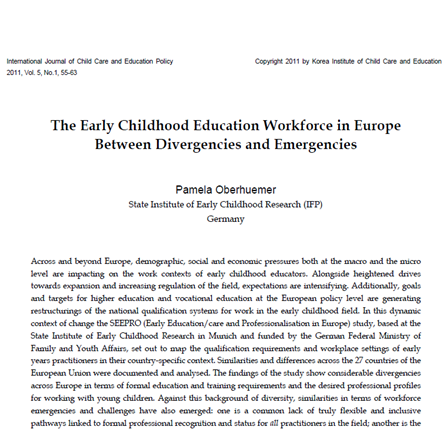
Summary:
Across and beyond Europe, demographic, social and economic pressures both at the macro and the micro level are impacting on the work contexts of early childhood educators. Alongside heightened drives towards expansion and increasing regulation of the field, expectations are intensifying. Additionally, goals and targets for higher education and vocational education at the European policy level are generating restructurings of the national qualification systems for work in the early childhood field. In this dynamic context of change the SEEPRO (Early Education/care and Professionalisation in Europe) study, based at the State Institute of Early Childhood Research in Munich and funded by the German Federal Ministry of Family and Youth Affairs, set out to map the qualification requirements and workplace settings of early years practitioners in their country-specific context. Similarities and differences across the 27 countries of the European Union were documented and analysed. The findings of the study show considerable divergencies across Europe in terms of formal education and training requirements and the desired professional profiles for working with young children. Against this background of diversity, similarities in terms of workforce emergencies and challenges have also emerged: one is a common lack of truly flexible and inclusive pathways linked to formal professional recognition and status for all practitioners in the field; another is the continuing need to seek more effective ways of including men in the early childhood workforce.



